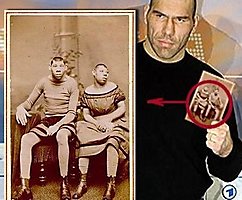Why a man's life is worth?
 Bashny.Net
Bashny.Net

Why a man's life has tsennostV end of the twentieth century, in front of us got one of the most difficult intellectual questions: "What is man?" To some extent, this question is the subject of discussion of many academic disciplines: law, psychology, economics, sociology, art, philosophy and theology. And the answers that we find to be important not only for our personal lives, but also for our collective life in society. We need to understand feature and "personality" of every person, and we also need to understand the inherent inhumanity of people towards each other.
In this short article I want to consider only one small part of the issue of human nature - namely, why human life has intrinsic value? This question hides a lot of other important issues, such as: Why do we have to protect human rights, why do we have to provide medical and humanitarian aid, and why should we worry about the security of the individual.
And I think it is clear that this is not just a question of meta-ethics, but the problem of the foundations of philosophy. Any philosophy without a satisfactory explanation of the value of human life in need of serious revision.
In modern thought has a tendency to give two types of answers to the question "Why is human life worth?" Some argue that the value of the person is achieved by human activity or abilities, while others argue that the value of the person is the gift of interpersonal relationships. The first approach can be called "functionalism", the second - "personalism." A functional view of human worth is usually born in a materialistic world view. The views of human dignity from the perspective of personalism is usually to be found among the adherents of theism. View of human dignity in terms of functionalism sometimes lead to a review of the form of homo-sapiens (Homo sapiens), deprived of vital functions, such as subhuman, useless creature. A look at human dignity from the perspective of personalism leads us to a sincere self-sacrifice for the sake of our loved ones. This requires an explanation; first illustrate functionalism, then personalism.
Interesting point of view, functionalism is presented in the works of Michael Tooley. He asked what qualities should have a creature to have a right to life. It is clear that the right to life is fundamental to all the rights that you can have. His answer goes something like this. He cites Jones Faiynberga "Being that can be right - it is those who have (or may have) interests." This means that "there is absolutely can not have any rights and, of course, can not have rights to life as long as it will have an interest (that is, to make plans for the future). "And in order to have the interest, being must be of sound state of mind and have life experiences and desires. And to have the desire to continue living, it must have the idea of self-realization in the future.
All this seems very reasonable, but the problem becomes apparent as soon as one becomes aware of how it uses its principles. Obviously, with this system, he can defend abortion. It also protects the infanticide as babies, of course, do not have the ability to think, and therefore can not have the idea of self-realization itself. But many animals are highly likely to have the right to life and, perhaps, equal human rights, since it seems that they have the interest and the concept of self-actualization. Interestingly, Tooley uses the word "murder" to describe the killing of highly developed animals, and forces to make the assumption that a person in a coma for a short-term, has no rights in his system. What began as a theory of human rights, leads to the conclusion that infanticide is morally justified, but upotreblint to eat meat and wear leather shoes - murder. This is a prime indicator of risk of developing a basis to consider the value of a man with his functions, in this case there is an interest.
To some extent, a similar point of view we find functionalism in the philosophy of Mary Ann Warren. She asks: "What is particularly being has the inherent right to life, liberty and the pursuit of happiness? Although it explicitly cites the American Declaration of Independence, its point of view, I think, it is very different from the Declaration. She suggests that we distinguish between genetic belonging to humanity and personality, and the only person, not being related to people on genetic grounds, has a moral right. She says: "Imagine a space traveler landed on an unknown planet and suddenly meet a race of beings, quite unlike those he had ever met or that he had ever heard. If he wants to make, how to behave morally in relation to these creatures, he must somehow solve the people whether they have thus all moral rights, or they are being, for which we should not experience feelings of guilt, using them, such as food. "
In answering these questions, it suggests that personality traits similar to the following:
1) consciousness, in particular the ability to feel pain;
2) the ability to reason;
3) conscious activity;
4) the ability to communicate;
5) the existence of self-awareness, self-image.
She does not believe that the creature must meet all five criteria in order to be a person. Only two of them may be significant. But the absence of all five certainly suggests it claimed that the creature is not a person and therefore has no moral rights.
Her list of personality traits is pretty good. Of course, all these features we usually see in others. But the crucial question for us is whether or not anyone else to win the status of the person using the availability of statutory functions and abilities, or status of the person is what is given as a gift.
It is clear that its approach - a functional approach, and her answers will lead to the same problems as the answers Tooley. It quite clearly says that people at the beginning and end of his life can not be individuals, and that they do not have moral rights.
The third striking example of functionalism found in the works of the philosopher John Cobb. He argues that although the right to life is quite fundamentally, it is not absolute. It happens, and therefore is subject to the right people to implement their plans. It is the existence of plans for implementing the special value attached to human life and is what gives you the right person.
Cobb clarifies his point of view, resorting to a sharp contrast. He contrasts the life of the individual infant's life and the life of the animal. Baby on the way of becoming a person is undergoing two major changes. First, while the infant lives entirely in the present, the child begins to build their own plans, which require respect and attention. Second, in infancy whole experience is to meet the needs of his body, while the child uses his body to implement their plans. And Cobb thinks that animals tend to be in the process of life no change from the simple satisfaction of the needs of his own body to use them to implement their own plans.
The problem with this theory is. that people who do not have or will not have plans, do not have the moral status of the individual and, therefore, their lives have no particular moral value. It seems that some animals might cross the border of the animal condition and become personalities. These arguments, in my opinion, lead to moral chaos, because the status of the individual is won acquisition of certain abilities - namely, the existence of the plan. This is a prime example of functionalism.
These three examples are probably sufficient to show that functionalism in one form or another now widespread. It is used to protect abortion, infanticide, euthanasia and animal rights. In each case, the person must demonstrate certain abilities and functions, in order to win the status of the individual in the eyes of other people or the whole society. If someone fails to gain the status of a person, then his life should not try to defend morally or legally.
Obviously, all the above-mentioned philosophers to reflect to some extent Western individual. But the functional approach to the value of human personality is easy to make ideological orientation. By adding a bit of imagination, you can easily make a clarification of exactly what features and capabilities needed to win the "right person." And these functions can be selected on economic, religious, racial, or on the basis of the principle of human value to the state. And then the definition of what makes human life valuable, can be used to legitimize any violence, usually against a group of people who are out of favor with the authorities. An analysis of the ideologies of people who have committed heinous crimes against humanity in the twentieth century will lead to a tragic conclusion on the same topic: not everyone can win the "right person." Functionalist theorists usually speak with arrogant positions, explaining why human life has value, but they tend to finish explaining why life in the range of a particular society should not be appreciated. This calls into question the whole method and approach of functionalism.
An alternative to functionalism, I would call "personalism." All personalist among the different opinions combines a belief that the value of human life is a gift and the value of the gift "given" and is present even when certain human abilities or features are not available. In general, the personalist thinking within the Judeo-Christian tradition, and usually consider their theories as consonant with the biblical assertion that human beings are created in God's image.
A striking example of personalism in politics is the American Declaration of Independence. Warren did not mention the part that says that people "are endowed by their Creator with inalienable rights."
In the eighteenth century, during the Anglo-American political negotiations, some people said that human rights are transferable, they can be lost. This was one of the supposed moral justification of slavery, which is very similar to the functional point of view about the value of human life. In contrast, Thomas Jefferson and his colleagues deliberately asserted that human rights are inalienable, as a gift from God. According to this way of thinking, the value of personality did not win any functions and powers and therefore can not be lost. The value of a person is a gift from God.
On the other hand personalism it appears in the works of Soren Kierkegaard, Danish philosopher of the nineteenth century, which is often called the "father of existentialism". In the "sickness unto death," he writes:
"Steps in the mind of the person from whom we still were in the service of being within the definition of the human person or the person, which is a measure of the man. However, this person acquires a new quality in the sense that this person is in direct sight of God. This person is no longer just a man, but what I would say, hoping not to be misunderstood, theological identity - the person in the eyes of God. And what an infinite reality of that person receives, being before God. Shepherd, who (if it were possible) is the only person in the eyes of cows - a very small personality; and the same we can say about the control, which is the only person in the eyes of slaves, because in both cases, lack the scale or evaluation criteria. A child who is still as benchmarks themselves were the only parents, becomes a person when he has acquired the status of a person in accordance with serving as an assessment criterion. But what gets exclusivity boundless personality, taking as benchmarks God! & Quot;
Kierkegaard seems to claims that a person's worth is to some extent the concept of which is dependent on the relationship between man, the value of a person depends on the relations in which it is located. Then, if all people have any connection with God, consciously or unconsciously, positive or negative, this link gives the person of infinite value. Clearly, this is a gift of value, independent of the functions.
German Germut Tilike was outstanding contemporary personalist and wrote his scientific works on ethics primarily as a reaction to the abuse of the Nazis. He claims that human dignity - always inalienable dignity, received as a gift from outside, not from the ontological qualities of a person, whether it is freedom, identity, responsibility, consciousness, or anything else. The reason that he believed it was his belief that humans - creatures that are in certain respects, created in the image and likeness of God, and hast made for fellowship with God. The image of God in man, he says, has nothing to do with the properties and qualities of the person. "He probably has to do with the inherent dignity of that person possesses both the divine prototype, the original of which is found only in Jesus Christ." When he uses the term "integral" to describe human dignity, he consciously follows the theology of Martin Luther. Luther said that we can not be accepted by God only on the basis of innate inner virtue, but only on the basis of an integral external righteousness, we received through Jesus Christ. Tilike argues that our dignity as our righteousness, is related to the fact that "God is mindful of us," and not to something inside us. And since God is mindful of us, He speaks to us through his creation and Jesus Christ in a way that the dignity and worth of every individual are those that can not be lost. Even if many of the normal functions of a person lost, the value and dignity of the individual is not lost, as they depend on the fact that God is mindful of man and turns to this man. And if human dignity is the result of treatment of God to us, the presence of human dignity assumes an important task: the realization of this connection on the part of man.
It is clear that the view of a person's worth in terms of personalism lead to very different conclusions about many aspects of modern life that is different from the functional point of view. Medical assistance, human rights, humanitarian aid and personal safety are just a few areas that look different when you look at them through the eyes of a personalist.
And it should be clear that functionalism is usually part of the materialist worldview, whereas personalism is usually part of the theistic worldview. Although probably have personalists atheist and maybe functionalists-theists, but such combinations have strong points of view of internal contradictions.
It is often said that among Western thinkers faith in God has died in the nineteenth century, and faith in man - in the twentieth. Contrary to the hopes of Nietzsche, the loss of faith in God led us to feeling super-human beings, and to perceive each other as subhuman. But since we can now see clearly and cultural failure and mental inconsistencies of atheistic materialism, maybe we can hope for is that faith in God and man can be restored.
European Humanities University, Minsk, Belarus Galina Golovko translation.
Tags
See also
How beautiful Amsterdam
Card body: at the level of the body to change a life
100 WAYS TO LIVE LIFE TO THE FULL
The Alfred Laengle: Symmetry values
Facts about the person
Brutal Truth
5 WAYS TO ZERO AND MAKE YOUR LIFE General cleaning

















